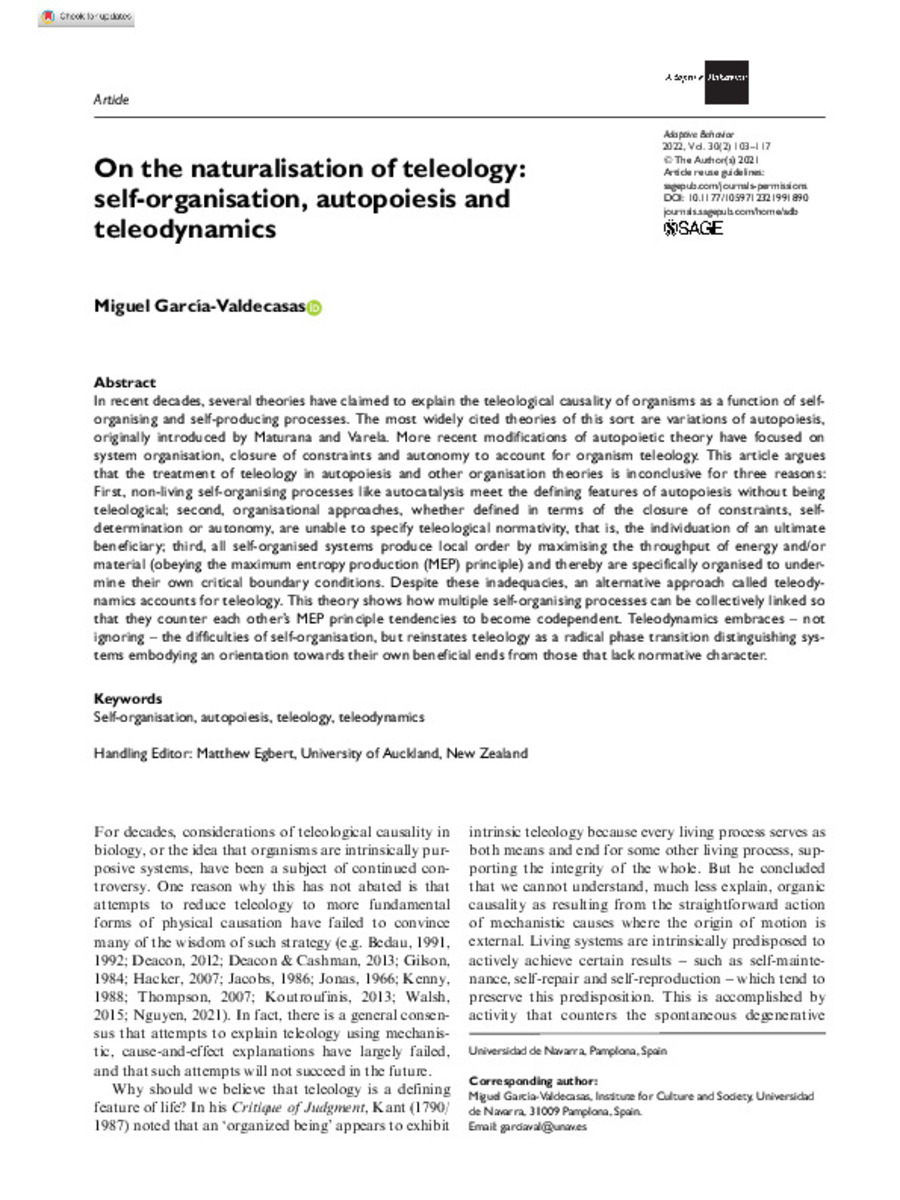Registro completo de metadatos
| Campo DC | Valor | Lengua/Idioma |
|---|---|---|
| dc.creator | García-Valdecasas, M. (Miguel) | - |
| dc.date.accessioned | 2024-01-17T12:24:27Z | - |
| dc.date.available | 2024-01-17T12:24:27Z | - |
| dc.date.issued | 2022 | - |
| dc.identifier.citation | García-Valdecasas, M. (Miguel). "On the naturalisation of teleology: self-organisation, autopoiesis and teleodynamics". Adaptive Behavior. 30 (2), 2022, 103 - 117 | es |
| dc.identifier.issn | 1059-7123 | - |
| dc.identifier.uri | https://hdl.handle.net/10171/68397 | - |
| dc.description.abstract | In recent decades, several theories have claimed to explain the teleological causality of organisms as a function of self- organising and self-producing processes. The most widely cited theories of this sort are variations of autopoiesis, originally introduced by Maturana and Varela. More recent modifications of autopoietic theory have focused on system organisation, closure of constraints and autonomy to account for organism teleology. This article argues that the treatment of teleology in autopoiesis and other organisation theories is inconclusive for three reasons: First, non-living self-organising processes like autocatalysis meet the defining features of autopoiesis without being teleological; second, organisational approaches, whether defined in terms of the closure of constraints, self- determination or autonomy, are unable to specify teleological normativity, that is, the individuation of an ultimate beneficiary; third, all self-organised systems produce local order by maximising the throughput of energy and/or material (obeying the maximum entropy production (MEP) principle) and thereby are specifically organised to under- mine their own critical boundary conditions. Despite these inadequacies, an alternative approach called teleody- namics accounts for teleology. This theory shows how multiple self-organising processes can be collectively linked so that they counter each other’s MEP principle tendencies to become codependent. Teleodynamics embraces – not ignoring – the difficulties of self-organisation, but reinstates teleology as a radical phase transition distinguishing sys- tems embodying an orientation towards their own beneficial ends from those that lack normative character. | es_ES |
| dc.description.sponsorship | The author(s) disclosed receipt of the following financial sup- port for the research, authorship, and/or publication of this article: The work done by the author was supported by the Mobility Program of the Spanish Ministry of Science and Innovation for Senior Academics for a stay at the University of California, Berkeley in 2019. | es_ES |
| dc.language.iso | eng | es_ES |
| dc.publisher | Sage | es_ES |
| dc.rights | info:eu-repo/semantics/openAccess | es_ES |
| dc.subject | Materias Investigacion::Arte y Humanidades::Filosofía | es_ES |
| dc.subject | Self-organisation | es_ES |
| dc.subject | Autopoiesis | es_ES |
| dc.subject | Teleology | es_ES |
| dc.subject | Teleodynamics | es_ES |
| dc.title | On the naturalisation of teleology: self-organisation, autopoiesis and teleodynamics | es_ES |
| dc.type | info:eu-repo/semantics/article | es_ES |
| dc.identifier.doi | 10.1177/1059712321991890 | - |
| dadun.citation.endingPage | 117 | es_ES |
| dadun.citation.number | 2 | es_ES |
| dadun.citation.publicationName | Adaptive Behavior | es_ES |
| dadun.citation.startingPage | 103 | es_ES |
| dadun.citation.volume | 30 | es_ES |
Ficheros en este ítem:
Estadísticas e impacto
Los ítems de Dadun están protegidos por copyright, con todos los derechos reservados, a menos que se indique lo contrario.






